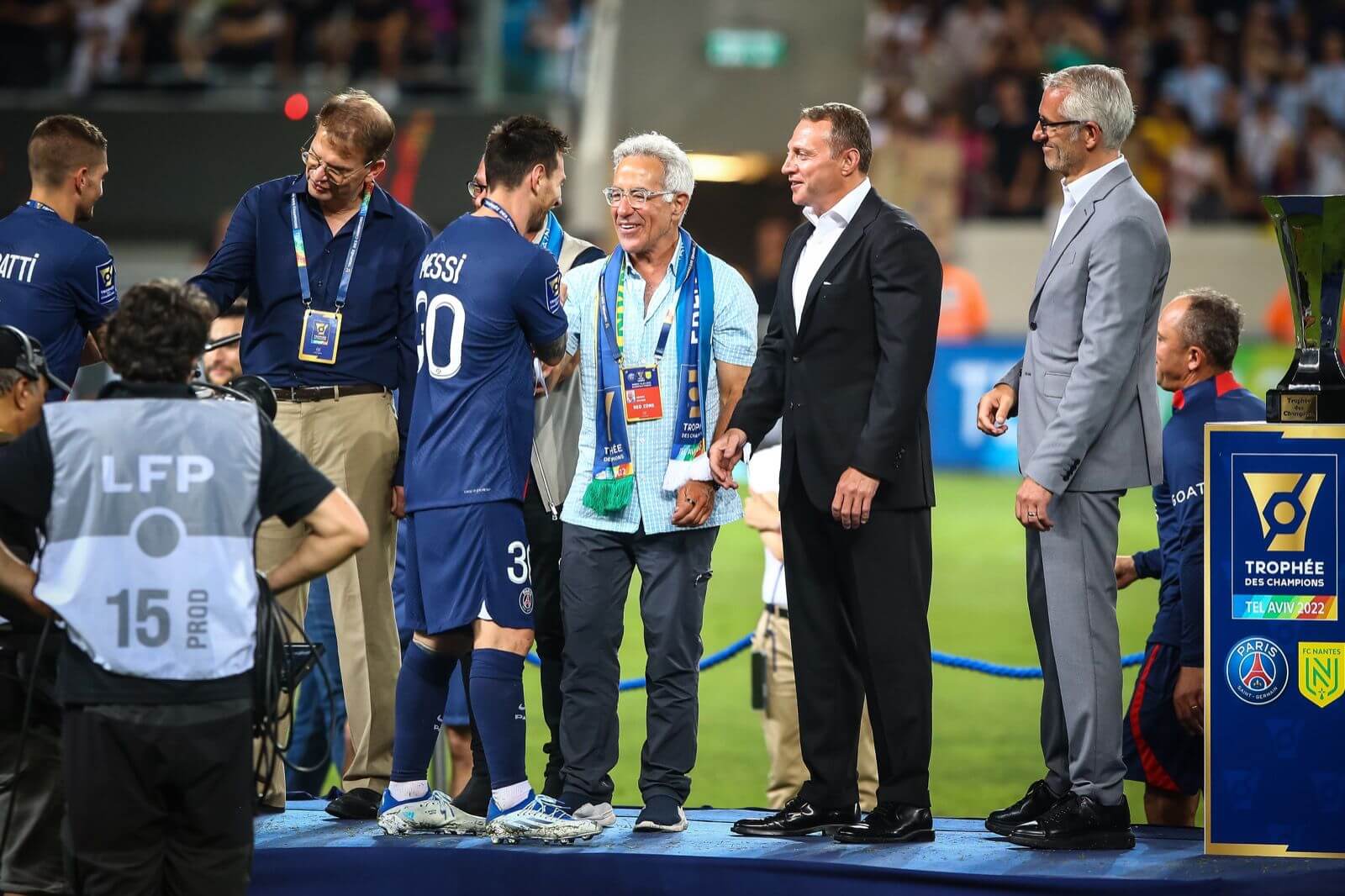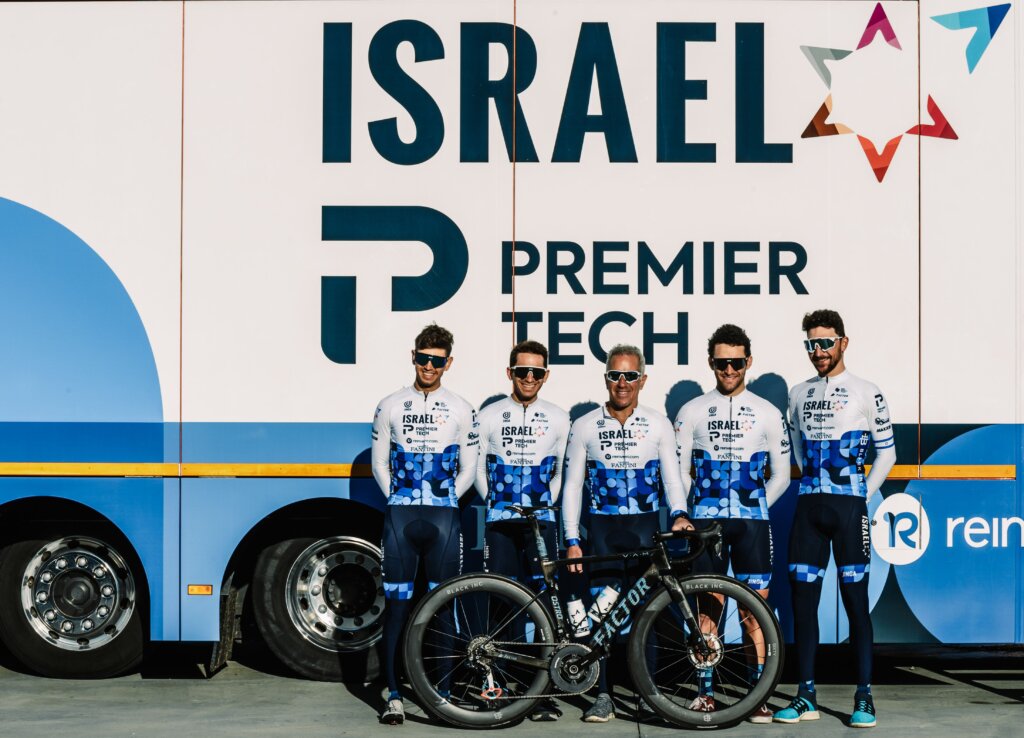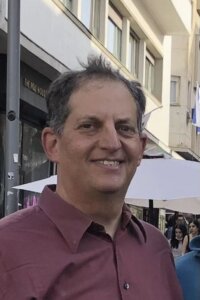He brought Madonna and world-class cycling to Israel. Now he’s eyeing the World Cup.
Philanthropist Sylvan Adams said he doesn’t personally care about soccer, but wants to score a major goal for his adopted nation

Graphic by Angelie Zaslavsky
TEL AVIV — The 30,000 fans filling Bloomfield Stadium to near-capacity cheered wildly when Lionel Messi and Neymar, two of soccer’s biggest stars, scored goals in Paris Saint-Germain’s 4-0 victory over F.C. Nantes in the French Super Cup here on Sunday night.
But international viewers of the game’s broadcast were more the audiences that Sylvan Adams, 64, had in mind when he brought the game here.
Same when he paid the Giro d’Italia, the world’s second-most important road cycling race, to hold its first three stages throughout Israel in 2018.
A Montreal native who immigrated to Israel in 2016, Adams imports big sports events to Israel to garner media coverage that showcases his adopted homeland as — in his words — “a normal, Western democracy.”
That’s also why Adams owns the Israel-Premier Tech bike team that competes in the Union Cycliste Internationale’s World Tour.

He’s now organizing a bike race, dubbed The Peace Tour, to be held next year in Israel and two countries with which it signed treaties in 2020: Bahrain and the United Arab Emirates.
“Sports, by far, addresses the greatest audiences of any activity on Earth,” he said in an interview in the penthouse duplex along Tel Aviv’s shore where he lives with his wife Margaret.
But Adams has ventured beyond sports to burnish Israel’s reputation. In 2019, he brought Madonna to Tel Aviv to perform at the Eurovision song contest and was a major donor underwriting Israel’s uncrewed spaceship Beresheet that reached the moon before crashing. “We intended to land in one piece; we landed in 1,000 pieces,” he quipped.
He’s aiming even higher.
Adams now seeks to bring one of sports’ grandest events, soccer’s World Cup, to Israel in 2030.
He’s putting together a joint bid with Egypt and Morocco, an effort he’ll pursue while visiting Qatar for this autumn’s World Cup.
“I don’t give a hoot about soccer,” Adams said. “It’s not about me. It’s not about what I like. It’s about what other people like.”
Fans in the Foreign Ministry
Tal Brody, who serves in a volunteer position as the Israeli foreign ministry’s ambassador of goodwill, sees Adams as a national asset — someone who understands the value of promoting the country through sports and has the means to bring major athletic events here.
It’s a topic Brody knows something about. As a basketball star who’d immigrated from New Jersey, Brody led Maccabi Tel Aviv to the 1977 European Cup championship, an achievement he famously proclaimed at the time put Israel “on the map.”
Adams’ mission “has its weight in gold when it comes to public diplomacy,” said Brody. “The public should understand he’s doing very, very good things for Israel.”
That includes building a velodrome near Tel Aviv’s Yarkon Park, athletic-training centers at Tel Aviv University and Beersheva’s Ben-Gurion University, an emergency department at Tel Aviv’s Ichilov Hospital and a pediatric department at Holon’s Wolfson Medical Center. Adams recently contributed $1 million to complete a bike path in Elad following a terrorist attack there that killed three people in May.
Mark Mendelson, Adams’ friend from Montreal, said he “has become one of the most important Israelis in the international arena.”
The Jerusalem Post last year listed him 11th among the world’s 50 most influential Jews and dubbed him the country’s “special envoy.”
A survivor’s son
Adams made his fortune with Iberville Developments, the Canadian real estate company his late father founded. His Israel-related philanthropy runs to “the hundreds of millions of dollars,” Adams said.
Adams’ father, Marcel Abramovici, was a Holocaust survivor from Romania who worked as a butcher and a trader in animal felts before landing in real estate. He lived to be 100.
At last week’s Ichilov Hospital dedication, Prime Minister Yair Lapid told Adams that Marcel “would certainly be proud of you today.”
It’s a sentiment Marcel’s friends conveyed over time, although he “was not the kind of person to lavish compliments on his children” directly, Adams said.
The remark by Lapid “made my eyes moist,” Adams said.
The pleasure and politics of cycling
As a child, Adams played several sports. A friend introduced him to cycling, and he was hooked. At the recent international sports festival in Israel, the Maccabiah, Adams earned three gold medals and a silver in cycling’s masters (seniors) division.
Because of cycling’s popularity abroad, Adams splashes Israel’s name across team buses and jerseys. Rather than draw hostility, such visibility often reveals fans’ open-mindedness, he said.
He had the same thought again at last month’s Tour de France, cycling’s premier event. As is his habit, Adams cycled ahead of the team before each day’s stage. He saw hundreds of people camped out for good spots. Many cheered him by calling out in French, “Israel, allez, allez, allez!” (Let’s go, Israel).
“You can’t imagine how friendly the crowds were to us. They’re just sports fans, susceptible to having their minds polluted against us by the haters. They see us doing the sport we love and embrace us,” he said.
Israel’s critics can’t be swayed, he said, while those disinterested in international affairs but passionate about sports can be reached.
“I like cycling. I love Israel,” he said. “I’m using sport for diplomatic purposes and to raise our profile in a very positive way.”
Adams nearly plotzed on July 6 when Simon Clarke, an Australian, became the first rider representing Israel to win a stage at the Tour de France, a feat replicated two weeks later by Hugo Houle, a Canadian also representing Israel.
The stage wins were “incredibly gratifying,” Adams said.
In that race and others, Adams also welcomed interactions with Israel’s critics. “I get challenged, and I love to be challenged,” he said. He said he’s less patient with those who argue that Israel’s embrace of gay rights, the environment and even sports is a way for the country to gloss over its treatment of Palestinians.
“Every time we try to do something virtuous, we’re charged with hiding behind virtuous acts,” he said. “My projects are not there to convince them or engage them. They’re to appeal to the silent majority.”
In Rwanda, Israel-Premier Tech sponsors children’s and young women’s teams and is building a cycling center. Over the past year, Adams and others resettled more than 200 refugees from Afghanistan, including some of the country’s top female cyclists, primarily in Western Europe.
“I call the bike team the team of the Jewish people. We have ‘Israel’ on the jersey because it’s my brand,” Adams said. “I call myself the ambassador of cycling. I am using the team to build bridges.”






















